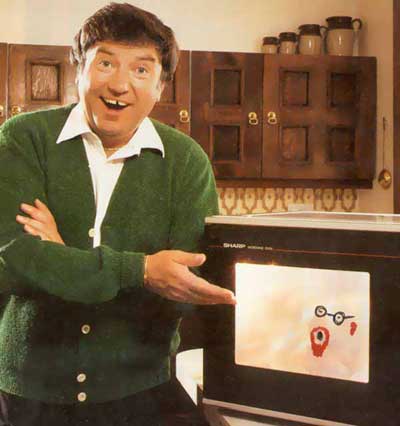 Yes, it's Jimmy Tarbuck, advertising Sharp's range of microwave ovens.
He's basting a chicken, on which one of the previous owners of the book
has drawn a face. What did Jimmy Tarbuck actually do? For that
matter, what did Ken Dodd do? They were both always around in the 80s,
but what did they... do?
Yes, it's Jimmy Tarbuck, advertising Sharp's range of microwave ovens.
He's basting a chicken, on which one of the previous owners of the book
has drawn a face. What did Jimmy Tarbuck actually do? For that
matter, what did Ken Dodd do? They were both always around in the 80s,
but what did they... do?
If one piece of domestic technology could symbolise Britain's consumer
boom in the 80s, it's the microwave oven, although they had been around
since 1947, when Raytheon's five-feet-tall 'Radarange' hit the market
with a gigantic exploding noise. Derived from radar technology pioneered
in the Second World War, the microwave was a space-age miracle of technology
which ended up being used to heat pies and warm up takeaways. Nonetheless
it is an essential part of many people's lives and I, for one, would
be dead without it.
The first compact model - by Amana, also called the 'Radarange'- went
on sale in 1967, but it wasn't until the 1980s that the ovens became
popular in the UK. They spawned a mini-industry of books teaching people
how to cook things with one ('insert your food, turn the dial to the
appropriate time, press start, and wait!'), and also led many a child
to wonder what would happen if different objects - compact discs, bugs,
rats, one's younger sister - were microwaved. Some people see the lack
of effort associated with microwave cooking, and the general blandness
of most ready-prepared microwaveable good, as symptoms of a catastrophic
decline in society..
I don't know if there's a collector's market for old microwaves. The
Sharp R9600 Carousel pictured on the opposite page of the book (with
browning lever) is presumably still useful as a cooking device. There's
no indication of how powerful it is, although 650 watts would be about
right for a top-of-the-range model in 1983. It can be programmed to
cook something up to 12 hours in advance.
This picture bookends an article about how microwaves work, which I
found genuinely interesting because it's not the kind of thing they
teach in schools. There's a story, possibly apocryphal, about how microwave
cooking was discovered when some puzzled radar technicians noted a lot
of dead birds around their antennae. It therefore seems right to say
that, sometimes, you can't make an omelette without killing a few birds.